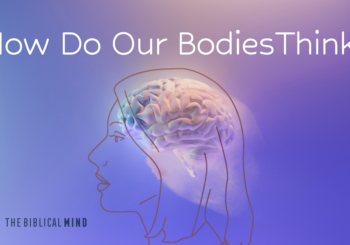Most Popular Articles and Podcast Episodes of 2022
The Biblical Mind’s top articles of 2022 explored biblical motifs and metaphors, the modern concerns of race and individualism, and high-level themes of wisdom and covenant. For the top podcast episodes, a clear trend emerged: the afterlife and end of days. Listeners were also interested in how the early church engaged with Scripture. What was their approach, and what can we learn from it?
See what caught the eyes and ears of The Biblical Mind community this year. Is your favorite on this list?
Top 10 Articles of 2022
10. Black American Slaves Understood the Bible Better Than White Americans Did. Why? (Dru Johnson)
In the 1800s, Americans used the Bible both to justify slavery and to condemn it. But if they read the same Bible, how is it possible that the North and South reached opposite conclusions about slavery? Dru Johnson considers the North’s and South’s opposite biblical conclusions about slavery in light of another set of differing biblical interpretations: those of Black Americans and white Americans, no matter which side of the Mason-Dixon line they inhabited.
9. Expressive Individualism: Our Twenty-First Century American Ba’al (Bruce Ashford)
Expressive Individualism is perhaps the reigning secular ideology in the U.S. today. Although most Westerners may not be aware of this phrase, they are likely very aware of its practical reality. Scripture can help us avoid falling prey to it.
8. Old Covenant vs. New Covenant? A Better Way to Understand God’s Promises (Joshua Martin)
Hearing of the “new” covenant, it’s easy to imagine it as set against an “old” covenant. But we need to look closer. When we see the rich variety of biblical covenants, we find that “old” and “new” is reductive. The covenants are plentiful, and the “new” covenant is woven of the same fabric as the old.
7. Jesus Didn’t Commend ‘Childlike Faith’ Like We Think of It (Philip T. Morrow)
When Jesus said to receive the kingdom “like a child,” he wasn’t extolling the virtues of “childlike faith.” Phil Morrow parses the English translation to explain what this metaphor was actually referring to.
6. Jesus the Philosopher (Jonathan Pennington)
Jesus talked like a philosopher and acted like a philosopher—but he also claimed to be more than a philosopher. The Gospels and the rest of earliest Christianity proclaimed that he was the anointed heir of the royal Davidic line, an exorcist and healer with unheard of power, a prophet, and the Son of God incarnate.
5. Bowing in the Service of God (Avital Levi)
Bowing before God is a physical act that helps us grasp the limitations of our power and knowledge. This new understanding shapes us to serve God in his endeavors of justice and charity.
4. How Morality in the Bible Emerges within Narrative (Shira Weiss)
In many scenarios, the Bible illustrates moral problems and elicits moral reflection, rather than decreeing unequivocal dogmas or moral judgments. When reading biblical narratives with multifaceted characters and complex situations, the reader is challenged to decipher ethical ambiguity, think through conflicts, and discover the implications for everyday life.
3. The Portrait of a Lady (Wisdom): How to Find and Keep Up with a Complicated Woman (David Beldman)
The portrayal of Lady Wisdom in Job and Ecclesiastes shows that in times of suffering, wisdom can be elusive. This can be a powerful reminder for those who are suffering and unable to see their way through it. Wisdom is absolutely indispensable for navigating our times—she’s worth pursuing—but we should not be surprised that she can be hard to discover.
2. Achilles’ Heel and Jacob the Heel-Grabber: Wrestling with Weakness, Fate, and the Mysterious Divine (Amy Gabriel)
Achilles’ heel and Jacob’s heel are both points of weakness, but while Achilles’ weakness gets him killed, Jacob’s weakness saves him. The stories of Achilles and Jacob both deal with the issues of human weakness, of struggling with fate (or providence), and of the often mysterious will of the divine. Yet Achilles’ heel is a mortal weakness, while Jacob’s heel-grabbing is a moral weakness that is confronted by a gracious God.
1. ‘I Am Who I Am’? The Real Meaning of God’s Name in Exodus (Michael Lefebvre)
Confusion arises about the meaning of God’s name translated “I am” and the related “Yahweh” when we read those terms through Western lenses. In English, for example, being verbs such as “am,” “is,” and “are” express either equivalence or existence. But the Hebrews, languishing under the whips of their oppressors, did not need to know simply that God exists. They needed to know that he was present with them. And that is precisely what God announced to Moses and memorialized in his name Yahweh, as defined by the verb ehyeh.
Top 5 Podcast Episodes of 2022
5. Q&A Series: Is There Marriage in Heaven? (Dru Johnson)
From Genesis, marriage looks like it is one of the most important parts of creation. So, does Jesus really say in Luke 20 that there will be no “marrying and giving in marriage” in the new heavens and earth? In the first episode of The Biblical Mind Q&A series, Dru Johnson examines the phrase “marrying and giving in marriage” across Scripture—and what Jesus really meant by it.
4. Revelation 101: Leaving Behind Left Behind (Jason Staples)
Modern Christians reading the Book of Revelation tend to filter it through the lens of popular fiction (such as the Left Behind series) and a very modern concept of its strange language and imagery. Though many passages remain mysterious, even to trained scholars, the Book of Revelation communicates a message of central importance about the present Kingdom of God and the role of the church in the world.
3. How the Early Church Engaged with Scripture (Brian J. Wright)
When we think of the early church, some of us might imagine groups of illiterate believers guided by one or two trained readers or teachers. In fact, the historical reality was very different. Brian J. Wright describes an ancient world obsessed with reading—especially public, communal reading of significant texts, including lots of questioning and dialogue.
2. A Jewish View of the Afterlife in the Hebrew Bible (Jeremiah Unterman)
For Christians accustomed to certain ideas of heaven and hell, other views of the afterlife in Scripture may seem strange. Dr. Jeremiah Unterman discusses Jewish views of the afterlife from the ancient to modern times, covering the concepts of sheol, ruach, gehenna, immortality, and judgment.
1. ‘Going to Heaven’ vs. Resurrection, the New Heavens, and the New Earth (J. Richard Middleton)
Many Christians picture eternal life as spending time in an ethereal heaven with God. But the biblical authors concern themselves with proclaiming the hope of the resurrection and preaching the Kingdom of God. The story of the Bible is not the story of what happens between death and resurrection, but the story of the “redemption of the world.”
Image created by Rubner Durais
Subscribe now to receive periodic updates from the CHT.




